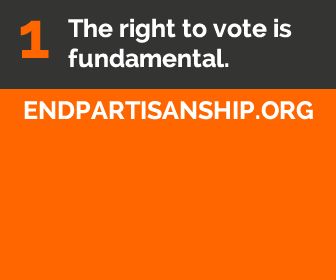It's Not About Parties, It's About Voters: An Argument for Open Primaries in Washington, DC

 Washington Blade, written by Peter Rosenstein, an argument is not only made for the latter, but the author says that if voters feel disenfranchised by the Democratic Party in Washington, DC, then the solution should be simple: join the Democratic Party.
Washington Blade, written by Peter Rosenstein, an argument is not only made for the latter, but the author says that if voters feel disenfranchised by the Democratic Party in Washington, DC, then the solution should be simple: join the Democratic Party.
"In today’s political world there seems to be some cache in telling people you are an independent. I haven’t quite figured out why not having your political views public and associating with the party that represents them makes you cool but some think it does."
This is an argument worth addressing because it is a popular sentiment among partisans. Some argue that independent voters are really closet partisans who just want to feel special by registering or self-identifying as an independent voter. They argue that there is nothing genuine about registering as independent because, at the end of the day, voters will lean one way or another. Except, how fair of an argument is this when the system only leaves voters with two real options?
The argument posed by Rosenstein is the same argument that leaders in the major parties make nationwide: If you want full, meaningful participation in the process, join a party.
As it has been reportedmany times on IVN, independent voters are not a myth. Their frustrations with the current system and the major parties that have abandoned them are real. That is why not only is self-identification at an all-time high, but independent registration nationwide has jumped over 11 percent in 5 years. An ever-growing segment of the voting population does not want to be affiliated with a political party. This means not just the major parties, but minor parties as well.
Independent voters are fed-up and they want better, adequate representation not only on the federal level, but state and local levels as well. That is what a Republic should ensure: an electoral system that guarantees a true representative democracy.
"The District is a Democratic town because the majority of the people living here believe in the principles of the Democratic Party and are willing to stand up for them," Rosenstein writes.
This may be very true. Democrats in DC obviously outnumber Republicans and other political demographics, but reforming primary elections to an open primary system won't change this. Democrats will still continue to overwhelmingly win elections as long as popular opinion favors their party.
We have to get passed the mindset that the only colors that matter in American politics are red and blue. The political landscape in the United States is as dynamic and beautiful as its physical landscape -- full of people with unique ideas that are not confined to two parties or two ideologies.
Open partisan primary elections are just a tiny step in the right direction to allow voters to participate in elections they pay for so they can have a say on who ends up on the general election ballot. As issues will remain over voters having meaningful participation in these elections, the obvious next step would be to consider nonpartisan reform.
Rosenstein further writes:
"An activist in politics from a very young age, there is pride in the party I have chosen and an unwillingness to see all the work so many party activists have accomplished potentially be undone by those not in the party choosing its candidates."It is a wonderful thing to not only be a proud political activist, but a proud member of a political party. Political parties allow voters and citizens to join with like-minded individuals to pursue common political goals. Further, the Democratic Party is a private organization so why should non-members be able to participate in the selection process of candidates for this private organization?
This argument, posed by many partisans nationwide, not only has merit -- these people are right. A private organization should be able to decide who gets to select its candidates. That is, as long as the elections are also private, and by that I mean privately-funded and privately-administered by the party. The problem is that closed partisan primaries in Washington, DC are paid for with public funds -- taxpayer dollars -- and administered by the city using public resources and facilities.
If a voter contributes to the funding of elections, even if it is a small degree, they have a right to participate in those elections. Not only that, but the right of every voter to have full, meaningful participation in the electoral process should be protected by all levels of government.



